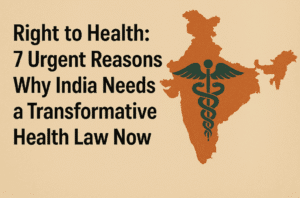Right to Health: 7 Urgent Reasons Why India Needs a Transformative Health Law Now
Though not explicitly enshrined as a fundamental right, India’s Constitution implicitly guarantees health through Article 21 (Right to Life) and Directive Principles mandating public welfare. Judicial activism has expanded this, declaring healthcare integral to human dignity in landmark rulings like Paschim Banga Khet Mazdoor Samity (1996), which held states accountable for emergency care. Yet systemic inequities persist: healthcare spending remains alarmingly low (1.2% of GDP), rural areas face severe doctor shortages, and out-of-pocket expenses devastate millions. While schemes like Ayushman Bharat aim to bridge gaps, their lack of legal enforceability perpetuates uneven access.
Globally, nations like South Africa and Brazil treat healthcare as a constitutional right, enabling citizens to demand accountability—a model India must adopt. A comprehensive health law is urgent to transform healthcare from a policy promise to a legal entitlement, ensuring equity, quality standards, and pandemic preparedness. Without statutory backing, India’s health aspirations risk remaining a silent pledge, leaving millions vulnerable in crises. Post-COVID, the stakes are clear: health is not charity, but a right foundational to justice and dignity.

Right to Health: 7 Urgent Reasons Why India Needs a Transformative Health Law Now
While the Indian Constitution does not explicitly mention the “right to health” as a fundamental right, its essence is woven into the nation’s legal and moral fabric. This silent promise, however, clashes with the harsh reality of a fragmented healthcare system marked by inequities, underfunding, and inconsistent access. The journey to bridge this gap—spanning judicial activism, constitutional principles, and global benchmarks—reveals why India needs a transformative health law to secure this right for its 1.4 billion citizens.
Constitutional Foundations: Reading Between the Lines
The framers of India’s Constitution embedded health as a guiding principle rather than an enforceable right. Article 21 (Right to Life) has been the cornerstone for judicial reinterpretation, evolving to include the “right to live with dignity,” which inherently requires access to healthcare. Meanwhile, Directive Principles of State Policy (DPSP) under Articles 38, 42, and 47 explicitly task the state with improving public health, nutrition, and working conditions. Though non-binding, these principles reflect a constitutional commitment to welfare—a vision often sidelined by policy inertia.
Judicial Activism: Transforming Health into a Fundamental Right
Indian courts have played a pivotal role in translating constitutional ideals into actionable rights. Landmark judgments include:
- Consumer Education and Research Centre v. Union of India (1995): Recognized healthcare as integral to workers’ rights under Article 21.
- Paschim Banga Khet Mazdoor Samity v. State of West Bengal (1996): Ruled that denying emergency treatment violates the Right to Life, mandating states to provide adequate medical infrastructure.
- Mohinder Singh Chawla v. State of Punjab (1997): Declared healthcare a fundamental human right, emphasizing the state’s duty to ensure access.
These rulings underscore health as inseparable from human dignity. Yet, judicial orders alone cannot address systemic gaps.
Reality Check: A Healthcare System in Crisis
India’s healthcare spending languishes at 1.2% of GDP (2023), far below the global average of 6%. Stark disparities persist:
- Rural Neglect: 65% of India’s population resides in villages, yet rural areas have 3x fewer doctors per capita than urban zones.
- Financial Burden: Out-of-pocket expenses push 55 million Indians into poverty annually.
- Social Inequities: Caste, gender, and geography dictate access. For instance, maternal mortality rates in marginalized communities are 2–3x higher than the national average.
Schemes like Ayushman Bharat and the National Health Mission, while progressive, lack statutory backing, leaving implementation uneven and unenforceable.
Global Lessons: What India Can Learn
- South Africa: Section 27 of its Constitution guarantees healthcare rights, enabling citizens to sue the state for lapses.
- Brazil: Treats healthcare as a “universal right” under Article 196, mandating free, equitable access through its Unified Health System (SUS).
- Thailand: Achieved 99% health coverage via the Universal Coverage Scheme (2002), reducing out-of-pocket spending to 14%.
These models highlight how legal frameworks institutionalize accountability and equity—elements missing in India.
The Case for a Comprehensive Health Law
A dedicated health legislation must address:
- Legal Enforceability: Define health rights as justiciable entitlements.
- Accountability Mechanisms: Establish grievance redressal bodies and penalties for non-compliance.
- Universal Standards: Mandate quality benchmarks for public and private healthcare providers.
- Equity-Driven Policies: Allocate resources to bridge rural-urban, caste, and gender divides.
- Financial Protection: Cap out-of-pocket expenses and expand insurance coverage.
- Pandemic Preparedness: Integrate protocols for health emergencies, building on lessons from COVID-19.
Conclusion: From Charity to Right
India’s judiciary has laid the groundwork, but judicial orders alone cannot dismantle systemic barriers. Health must transition from a “policy promise” to a legal guarantee—a shift from charity to entitlement. A comprehensive health law would not only fulfill constitutional aspirations but also empower citizens to demand accountability. As the pandemic exposed, health is the bedrock of human security and economic resilience. For India to truly honor its democratic ideals, the right to health must be more than a silent promise—it must become law.
You must be logged in to post a comment.